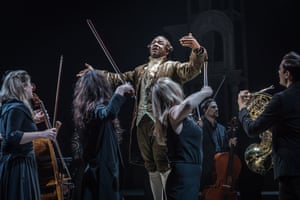The star of the National Theatre’s revival, streaming this month, talks about genius, unlocking characters and how Peter Shaffer’s play became an ‘orgy of artistic love’

‘The higher I have climbed, the more I have grown into myself as a human being’ … Lucian Msamati as Salieri in Amadeus. Photograph: Marc Brenner
The director Michael Longhurst has said that he wanted to show a Salieri who was not a classical villain. How did you approach the character to give him humanity and humour?
I knew the film and loved it and had also seen a production in Zimbabwe many years ago. When I sat down to read the script, what pinged out to me was that Salieri is a man who absolutely loves music. It is his lifeblood. The second thing was that in my own personal experience and the experiences of others I know, there is always that individual in your life [like Mozart] who makes you sit there, punching and kicking and scratching at the walls, saying: “How did they do that? How are they creating masterpieces when I’m creating stick figures?” So I could completely identify with Salieri in being both fascinated and disgusted by it.
You played Iago in Othello a year before this production. Was that role – of a man also eaten up by jealousy – preparation for this one?
The challenge in all of it is to find the weakest point in any character which, I believe, is how you tap into the humanity of that character without judgment. Tapping into jealousy in itself is very easy. It’s more difficult to tap into love for the victim of that jealousy; just as Salieri loves music, Iago loves Othello. I don’t think you can commit yourself to such a dogged path of revenge or retribution unless you feel a great love – from great love comes great hurt and hate. The hate is easier to access than the love and it’s more complicated with Iago.

On being cast as Salieri, you have said that if a viewer “can’t buy into the story because of my hue – that’s your problem”. What is your opinion of “blind” casting beyond colour, such as the recent news that Ian McKellen is to play an age-blind Hamlet?
I think a lot of this terminology has developed as a way to engender a particular status quo. By that I mean that within the idea of age- colour- gender- or any other blind casting, somewhere underneath it is the tacit understanding that “we are allowing you to have that which is ours”. So [there is the] notion that you are being allowed into the playground but just so you understand it is still our playground.
Winsome Pinnock recently suggested that when a black actor is cast in a traditionally “white” part they are cut off from the history of their black body. Do you agree?
That’s an interesting idea and I completely see the argument. I, however, would argue that in my creative endeavours and work as an artist the first thing I have connected to is the quality of the work of art. I don’t come into anything unaware of who or what I am and what it represents: my skin-colour and my heritage is mine and I carry it everywhere I go. Whenever someone talks about “colour-blindness” I say “I want you to see my colour.”
To go back to the idea of a playground, we, as artists, are players in an imaginative playground and none of us can create unless we have room to breathe and play. Having said that, what we are battling now is the question of what “universal” humanity looks and sounds like. What is problematic with the terminology of blind casting is whether you are saying age, race, gender, is outside the human experience.

The singers and orchestra all become part of the performance in Amadeus. How easy was it to navigate around all that movement on stage?
It was made easier by the exceptional bunch of players I worked alongside, and both the director, Michael Longhurst, and movement director, Imogen Knight, said that whether we were actors, opera singers or the orchestra, we were all one on stage. It was an orgy of artistic love. To be in a room listening to world-class opera singers and asking them, moist-eyed “How did you do that?” and then to see them moist-eyed as they watched us and being asked the same thing, was to be in a space where we could fully appreciate each other’s artistry, because of the democracy introduced by Michael and Imogen.
Salieri speaks of Mozart’s talent as God-given. Do you believe in genius as an innate quality?
I have spoken to such accomplished artists [about this]. I do believe there are some who are touched by the gods but then you have to get sociological: who had the resources? Who was backed? And how many “geniuses” have disappeared because they weren’t supported or didn’t have the resources? Also, is it really genius or is it genius because people are telling us it is? Or are we elevating our own sense of wonder [towards a “genius”] because it is outside of our own abilities?
Salieri speaks of Mozart as an “obscene child” channelling “the voice of God” and the play grapples with the idea that gifted people are not always morally deserving of their gift. What are your reflections on that?
I think that that’s the folly of the devout – the great falsehood that “I will get to heaven because I go to church and give alms to the poor and because I’m virtuous.”
You appear in the recently remade series of Alan Bennett’s Talking Heads, which were originally broadcast in the 1980s. Do you think the series resonates differently now?
Absolutely, but outside of that they are brilliant pieces of writing in themselves, even if some are bound within the confines of a specific time. In some ways they may feel dated or clunky but that’s OK. Some of them will resonate more than others, but I hope the [monologue] form resonates for an age of Zoom in a different way: the talking into a lens or a blank screen.

You said in a 2008 Guardian interview that others were often quick to ascribe your success to your skin-colour and that you have had to battle against that idea. Have you felt that change in recent times?
There are many of us, of black and brown hue, who have a different kind of imposter syndrome. Every time I have succeeded in what is considered to be a white-dominated role, there’s a part of you that’s going “Have I got this because I’m good? [or] to quote Ali G: ‘Is it because I is black?’”
For me now, I’m a much better actor than I was. I’m older, I’m more evolved and I can now say, empirically, that the roles of Iago and Salieri have come specifically because I’m the best at what I do. The higher I have climbed, the more I have grown into myself as a human being but there are always echoes. Getting Iago – which was the more openly provocative role in terms of tradition – was the moment I wanted to kill the voices that come to me in my 3am chats with myself once and for all. I must also say that part of the space I was granted in terms of playing Iago came from Iqbal Khan. Having a director of colour cannot be underestimated. It meant that the team had my back. I wasn’t the peculiarity in the room.
- Amadeus streams on YouTube from 16 July as part of National Theatre at Home. It will be available until 23 July. Iqbal Khan’s Othello is available on BBC iPlayer as part of Culture in Quarantine.
COMMENTS